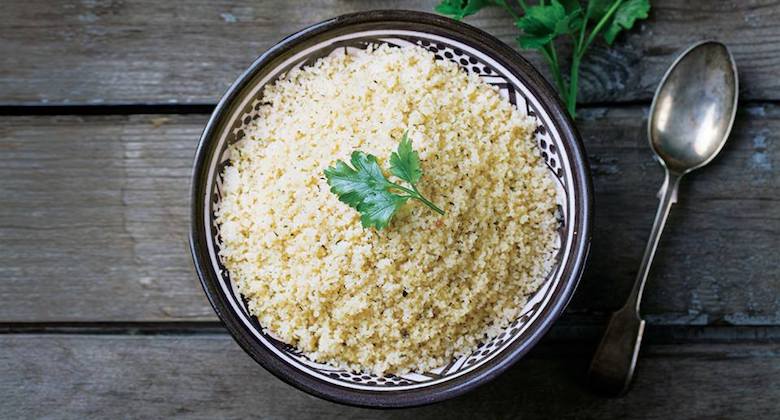
Say hello to fonio. The new to the block yet ancient grain is similar to both couscous and quinoa, with a mild, nutty flavor that makes it a versatile ingredient. At West Village’s Cafe Clover it pops up in the Israeli Chopped Salad, a lively dish ideal for brightening up winter days.
“We love it at Cafe Clover because not only does it have great flavor, but it is also gluten free and nutrient rich. I often infuse fonio with different vegetables and spices like beets, herbs and saffron,” says Cafe Clover’s executive chef and culinary director Garrison Price.
With grain bowls now everywhere, fonio is the latest to show up on restaurant menus and store shelves, but can this tiny grain that has existed for thousands of years catch on in the U.S., and in an ideal situation, improve the livelihoods of the West African farmers that produce it at the same time? That’s the hope of Brooklyn’s Yolélé Foods.
Founded in 2017, by chef Pierre Thiam, who grew up eating fonio in Senegal, and Philip Teverow, who helped introduce quinoa to the U.S. market as the director of the Dean & DeLuca brand, Yolélé Foods is attempting to create a market for the supergrain in the U.S. that supports West African farmers.
The company sources fonio from small farmers through SOS Sahel, their NGO partner, which has been working in Africa since the 1970s to increase farmer incomes and build stronger communities while also promoting resilient agricultural systems. Back in the U.S., Thiam, Teverow and the Yolélé Foods team are trying to get more home and professional chefs like Price using the grain.
“I’ve been obsessed with all things ancient grains for the last several years,” says Price. “Fonio is interesting to me because it has been around for thousands of years and is still relatively new to the U.S. market. Also, we can sleep a little better at night because purchasing this product helps support small farmers in various regions.”
Through Yolélé Foods, fonio is available throughout the U.S. on some store shelves and on 125 restaurant menus across the U.S., including among others Untitled and Dimes here in the city and institutionally at Rutgers and Yale.
But as fonio grows in the U.S., Yolélé Foods wants to be careful about that impact it will have in West Africa.
“Our approach focuses on preventing the boom and bust that happened with quinoa where it became so popular that demand outstipped supply and farmers made lots of money, which was great, but then the market invested in cheaper ways to produce it and the price plummeted,” says Teverow.
To that end Yolélé Foods is working to protect the identity of fonio as defined in the international community as grown by small farmers while also solving some production issues. Fonio matures quickly but is time consuming to turn into food as most of the production currently has to be done by hand. Yolélé Foods is in the process of building the first commercial mill for fonio farmers in West Africa, which they hope will increase the quality and the reliability of the grain while reducing the cost by 2020.
In the meantime in addition to availability at restaurants, fonio through Yolélé Foods can be found at a number of Whole Foods in New York City and nationally on Thrive Market. Pick up a bag and try at home using one of Yolélé Foods’ recipes, like this Creamy Fonio Hot Cereal with Dried Fruit.

CREAMY FONIO HOT CEREAL WITH DRIED FRUIT
Serves 6
INGREDIENTS
1 cup fonio
2 cups cold water
1 teaspoon salt
½ cup dried cranberries
½ cup raisins
2 cups almond milk (or soy milk)
2 teaspoons brown sugar
1 teaspoon ground cinnamon
½ fresh mango, chopped, or ½ cup fresh blueberries or 1 sliced banana
¼ cup chopped cashews, toasted (optional)
DIRECTIONS
To prepare the fonio, place in a large heavy saucepan. Add water and salt. Bring to a boil over high heat, then reduce heat, cover, and simmer gently for 5 minutes, stirring occasionally.
Add dried cranberries, raisins and milk in a large bowl. Stir to combine. Let stand for 1 minute. Stir in brown sugar, cinnamon and mango or other fruit.
Toast chopped cashews (if using) in a small dry skillet over medium-low heat, stirring constantly, until fragrant and lightly browned, 2 to 4 minutes.
Sprinkle with toasted cashews and serve.



